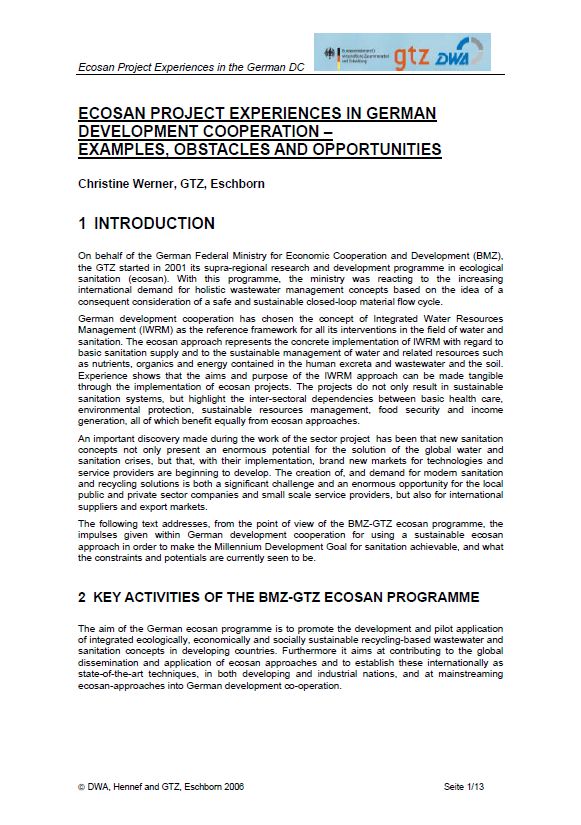Ecosan project experiences in German development cooperation - examples, obstacles and opportunities
C. Werner (2006)

Published in: 2006
Publisher:
Deutsche Gesellschaft für Technische Zusammenarbeit (GTZ) GmbH, Germany
Author:
C. Werner
Uploaded by:
SuSanA secretariat
Partner profile:
common upload
4658 Views
66 Downloads
Location of library entry
Content - Summary
On behalf of the German Federal Ministry for Economic Cooperation and Development (BMZ), the GTZ started in 2001 its supra-regional research and development programme in ecological sanitation (ecosan). With this programme, the ministry was reacting to the increasing international demand for holistic wastewater management concepts based on the idea of a consequent consideration of a safe and sustainable closed-loop material flow cycle.
German development cooperation has chosen the concept of Integrated Water Resources Management (IWRM) as the reference framework for all its interventions in the field of water and sanitation. The ecosan approach represents the concrete implementation of IWRM with regard to basic sanitation supply and to the sustainable management of water and related resources such as nutrients, organics and energy contained in the human excreta and wastewater and the soil. Experience shows that the aims and purpose of the IWRM approach can be made tangible through the implementation of ecosan projects. The projects do not only result in sustainable sanitation systems, but highlight the inter-sectoral dependencies between basic health care, environmental protection, sustainable resources management, food security and income generation, all of which benefit equally from ecosan approaches.
An important discovery made during the work of the sector project has been that new sanitation concepts not only present an enormous potential for the solution of the global water and sanitation crises, but that, with their implementation, brand new markets for technologies and service providers are beginning to develop. The creation of, and demand for modern sanitation and recycling solutions is both a significant challenge and an enormous opportunity for the local public and private sector companies and small scale service providers, but also for international suppliers and export markets.
The following text addresses, from the point of view of the BMZ-GTZ ecosan programme, the impulses given within German development cooperation for using a sustainable ecosan approach in order to make the Millennium Development Goal for sanitation achievable, and what the constraints and potentials are currently seen to be.
Bibliographic information
C. Werner (2006). Ecosan project experiences in German development cooperation - examples, obstacles and opportunities. Deutsche Gesellschaft für Technische Zusammenarbeit (GTZ) GmbH, Germany
Filter tags
English















